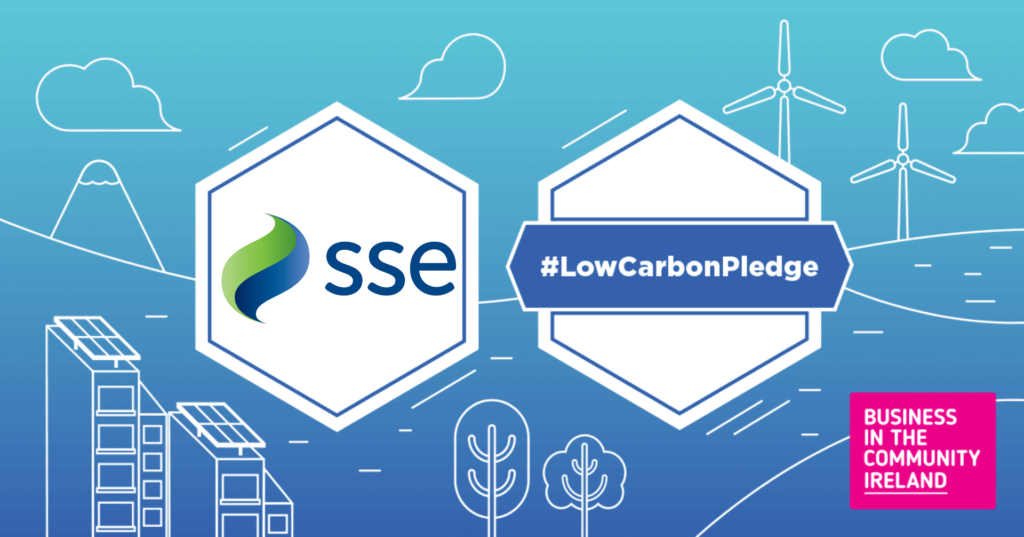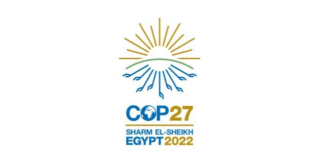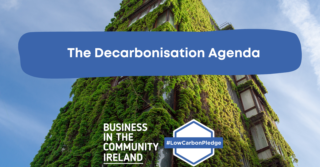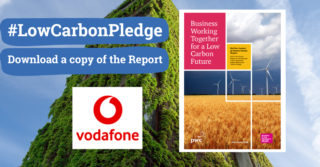How SSE Ireland is enhancing the sustainability and decarbonisation of its business operations
SSE Ireland has a strong heritage of renewable electricity production and a vision to be a leading energy company in a net-zero carbon world. Being both a producer and distributor of electricity has resulted in SSE developing deep capability in a diverse range of low carbon solutions, ranging from onshore and offshore wind farms to smart electric car charging infrastructure. While SSE’s low carbon heritage has historically shaped its strategy, increasing customer, investor and policy focus on the low carbon agenda encouraged SSE to see if it could further increase its already ambitious sustainability strategy across the UK and Ireland where it operates.
In order to frame its strategy, SSE used multiple lenses. One that is of particular interest is the Task Force on Climate-related Financial Disclosures (TCFD). This standard focuses on scenario analysis and is a useful tool to review climate-related risks and opportunities. The objective is to present an analysis of the potential financial impact of climate- related effects on its business per climate scenario.
In 2019, SSE reviewed its corporate strategy and set four new goals aligned with the UN’s Sustainable Development Goals (SDGs): (1) Cut carbon intensity by 50%; (2) Treble renewable energy output; (3) Help accommodate adoption of 10 million electric vehicles; and (4) Champion fair tax and a real living wage all by 2030. These four goals underpin SSE’s strategic focus on long-term, low-carbon and sustainable assets, demonstrating a commitment to delivering SSE’s strategy in a way that creates value for shareholders and for society. The targets set within these goals are also linked to the executive remuneration. In order to measure progress against the strategy, it was necessary to define a reporting structure that met internal objectives and also aligned with expectations from investor groups such as the Climate 100+ group. SSE elected to align targets and reporting structures with the science-based targets initiative (SBTI).
SSE has broken down its whole portfolio and applied science-based targets across all major segments and developed a full suite of initiatives with associated verification criteria. Additionally, SSE requires data to support its business choices, and science-based targets can help in setting concrete and inspiring targets to challenge business units.
As this data is seen as critical to the organisation, SSE seeks external validation for key data sets (PwC provides assurance on carbon intensity, scope 1, 2 and 3 and total emissions data, for example).
SSE recognises the importance of having longer term targets in place, even as the precise path to complete decarbonisation for both the country and SSE is yet to be fully determined. There are multiple pathways in the UK and Ireland through which SSE can decarbonise thermal generation or build the targeted level of renewables output. What is critical is that the business has certainty as to what the desired endpoint is, which allows management to make better investment decisions en route to achieving these goals.
SSE has a number of distinct businesses operating in Ireland and each has its own specific decarbonisation objectives. Here are some key initiatives that together will allow SSE to meet its overarching science-based targets.
Renewable Technology
SSE’s renewable energy business unit, SSE Renewables, has the largest portfolio of onshore wind farms operating in Ireland and is developing new wind energy projects, both onshore and now offshore, to power the low carbon future for the next generation. Delivery of its 2.5+GW development pipeline of new renewable energy projects over the coming years will contribute significantly to meeting Ireland’s overall ambition to reach 70% renewable energy generation by 2030, as set out in the 2019 Climate Action Plan.
Flexible Generation
SSE recognises the need for flexible gas-fired generation in the transition to a net-zero emissions future, complementing renewable production and maintaining security of supply. SSE Thermal currently operates one of Ireland’s most efficient gas-fired power stations at Great Island, Co. Wexford, which provides vital flexibility to the electricity system. The business is now exploring opportunities in carbon capture, usage and storage (CCUS) and hydrogen technology, which have the potential to decarbonise this conventional energy generation.
Green Energy Supply
SSE is a large energy supplier on the island of Ireland, providing electricity, natural gas and energy related services to both residential and business customers. Where business customers wish to reduce scope 2 emissions, SSE can supply 100% green energy. Moving beyond simply supplying energy sourced from renewables, the organisation works with its business customers to achieve corporate sustainability objectives through a number of products. These range from facilitating Corporate PPA’s for I&C customers, to supporting the implementation of energy efficiency measures, such as LED lighting upgrades, to investing in renewable generation through onsite solar installations. SSE has financially supported a wide variety of these energy efficiency projects for customers since 2014 and has delivered over 1,300 GWh of primary energy savings on a cumulative basis.
While the company is understandably focused on responding to the COVID-19 crisis, SSE is staying true to its carbon reduction strategy which is fundamental to its purpose and vision.
Download our latest guide to Setting Science Based targets.
Sign up to the #LowCarbonPledge







